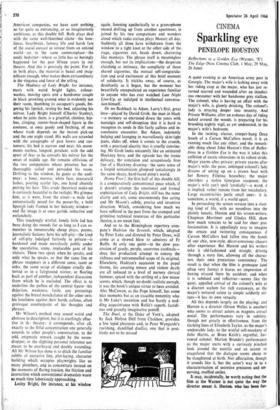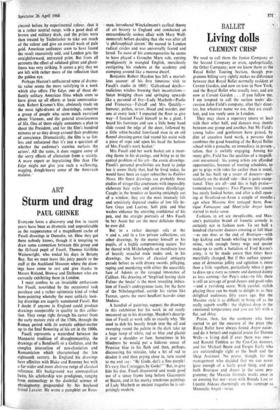CINEMA
Sparkling eye
PENELOPE HOUSTON
Reflections in a Golden Eye (Warner, 'X') The Edge (New Cinema Club, I May, 29 May, 26 June)
A quiet evening at an American army post in Georgia. The major's wife is lashing away with her riding crop at the major, who has just re- turned scarred and wounded after an injudici- ous encounter with her handsome grey stallion. The colonel, who is having an affair with the major's wife, is glumly drinking. The colonel's lady is straying deeper into insanity. And Private Williams, after an arduous day of riding naked around the woods, is preparing for his brooding nightly vigil, as yet undetected, in the major's wife's bedroom.
In the twining, elusive, creeper-hung Deep South of a Carson McCullers novel, it is an evening much like any other; and the remark- able thing about John Huston's film of Reflec- tions in a Golden Eye is the way it takes this collision of exotic obsessions in its robust stride. Major yearns after private; private yearns after major's wife; the poor, unhinged colonel's lady dreams of setting up on a prawn boat with her flowery Filipino houseboy; the major cherishes a stolen Georgian teaspoon; the major's wife can't spell `cordially'—a word, it is implied, rather remote from her vocabulary. Large eccentricities jostle small ones: it is, somehow, a world, if a world apart.
In persuading the screen version into a rivet- ing kind of life, with no nosedives into the plainly lunatic, Huston and his screen-writers, Chapman Mortimer and Gladys Hill, show how much remains to be said for sheer pro- fessionalism. It is appallingly easy to imagine the ornate and twittering consequences if Carson McCullers had fallen into the hands of our chic, new-style, decor-conscious chasers after experience. But Huston and his writers take it old-fashioned and straight, driving through a story line, allowing all the charac- ters their own precarious consistency . The result is that when the film is grotesque (and often very funny) it leaves no impression of having strayed there by accident; and when it is subdued. and reflective—scenes like the quiet, appalled arrival of the colonel's wife at a discreet asylum for rich castaways, or the major's tortured salute to simple soldierly vir- tues—it has its own veracity.
All this depends largely on the playing: and Huston is a director (Orson Welles is another) who seems to attract actors as magnets attract metal. The performances vary in subtlety, though not greatly in effectiveness, from the slashing lines of Elizabeth Taylor, as the major's undentable lady, to the wistful self-mockery of Julie Harris, or Brian Keith's regretful, fur- rowed colonel. Marlon Brando's performance as the major starts with a curiously pinched look around the nostrils and an accent so coagulated that the dialogue seems about to be slaughtered at birth. Not affectation, though it sounds like it, but the actor's way in to a characterisation of secretive pressures and un- nerving, muffled smiles.
It may, incidentally, be worth noting that the film at the Warner is not quite the way the director meant it. Heston, who. has been fas-
cinated before by experimental colour, shot it in a rather neutral range, with a good deal of brown and military drab, and the prints were then treated by Technicolor to take out much of the colour and give an overall wash of pale gold. American audiences seem to have found the result excessively odd, and London gets the straightforward, untreated print. But from all accounts the effect of subdued glitter and ghost- liness was very striking. It seems a pity that we are left with rather more of the reflection than the golden eye.
Perhaps Huston's unflustered sense of drama- tic value seems the more satisfying in a week which also offers The Edge, one of those de- fiantly solitary American films which seem to have given up all efforts at basic communica- tion. Robert Kramer's film, obviously made on the most tight-drawn of shoestrings, concerns a group of people who seem much exercised about Vietnam, and the general atrociousness of life. One of them edgily announces a plan to shoot the President, and for the film's hundred minutes or so they droop around their problems of conscience. Dramatically, the film is so list- less and unfocused that it's just a question of whether the audience's stamina outlasts the actors'. All the same, it does suggest some of the sorry effects of alienation from a society. A more expert or ingratiating film than The Edge might not give you such a wallowing, nagging, dough-heavy sense of the American malaise.'







































 Previous page
Previous page